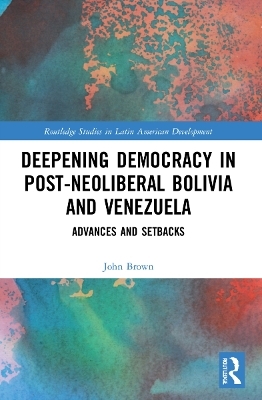
Deepening Democracy in Post-Neoliberal Bolivia and Venezuela
Routledge (Verlag)
978-1-032-20150-4 (ISBN)
This book provides a timely and nuanced analysis of the successes and shortcoming of efforts to move beyond market democracy in Bolivia and Venezuela.
A twin crisis of democratic representation and socio-economic precarity created space for anti-system outsiders to emerge on the left flank of traditional party-systems in Bolivia and Venezuela, paving the way for a "post-neoliberal" democratization process. Over the course of the projects headed by Evo Morales in Bolivia and Hugo Chávez and his successor Nicolás Maduro in Venezuela, however, power struggles emerged between a recalcitrant elite, the left-led government, and organized popular sectors. These tensions shaped the pathways that processes followed, with simultaneous democratization and de-democratization occurring whereby a partial deepening and extending of democratic quality for popular sectors was accompanied by the bending of liberal norms. Comparing the varying balance and forms of power between competing actors, this book offers a novel and rich explanation of the partial and stuttering efforts to advance a post-neoliberal democracy in Bolivia and Venezuela.
Bringing important insights on the reasons for the emergence of anti-system leaders and parties, the impact that they have on the quality of democracy, and how progressive governments interact with social movements, this book will be of interest to researchers studying Latin America, as well as those specializing in development and political science more broadly.
John Brown is a lecturer at the Centre for the Study of Politics, Maynooth University, Ireland.
Introduction: The crisis of market democracy and the emergence of anti-system outsiders. 1: Re-conceptualizing democratization in progressive-outsider cases. 2: Crisis of market democracy and making space for outsider Hugo Chávez: Venezuela in historical context. 3: Progressive and regressive centralization: the Hugo Chávez years, 1999-2013. 4: From regressive to authoritarian centralization: Nicolás Maduro, 2013-21. 5: Crisis of market democracy and making space for outsider Evo Morales: Bolivia in historical context. 6: Progressive and regressive centralization: the Evo Morales’ years, 2006-14. 7: Splits in the popular base, the return of the opposition, and the removal of Evo Morales, 2014-21. 8: Venezuela and Bolivia in comparison: toward a typological theory of outsider-led, post-neoliberal democratization. Conclusion: oligarchy, populisms, and pathways out of the crisis of democracy.
| Erscheinungsdatum | 16.03.2022 |
|---|---|
| Reihe/Serie | Routledge Studies in Latin American Development |
| Zusatzinfo | 4 Tables, black and white; 4 Line drawings, black and white; 4 Illustrations, black and white |
| Verlagsort | London |
| Sprache | englisch |
| Maße | 156 x 234 mm |
| Gewicht | 453 g |
| Themenwelt | Sozialwissenschaften ► Politik / Verwaltung ► Politische Systeme |
| Sozialwissenschaften ► Politik / Verwaltung ► Staat / Verwaltung | |
| Sozialwissenschaften ► Soziologie ► Spezielle Soziologien | |
| Wirtschaft ► Volkswirtschaftslehre | |
| ISBN-10 | 1-032-20150-9 / 1032201509 |
| ISBN-13 | 978-1-032-20150-4 / 9781032201504 |
| Zustand | Neuware |
| Haben Sie eine Frage zum Produkt? |
aus dem Bereich


